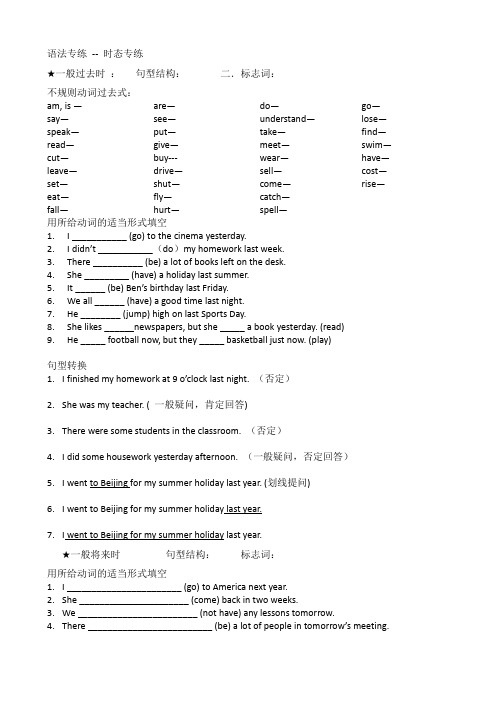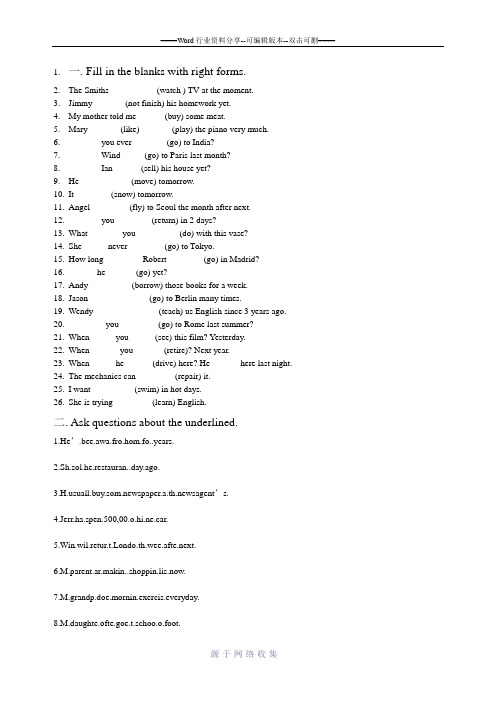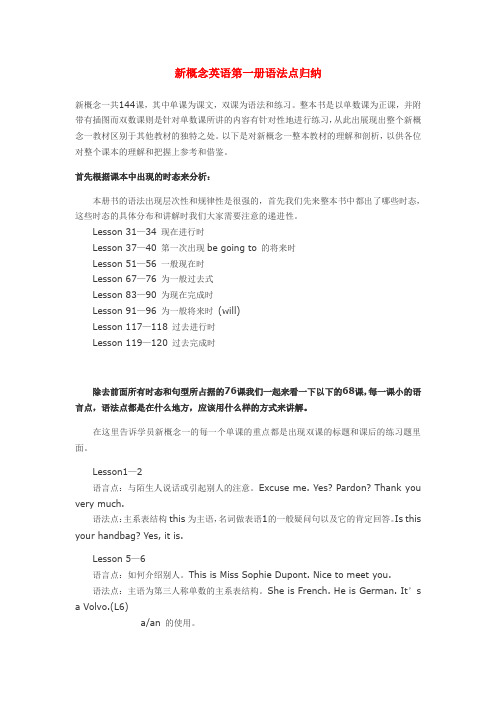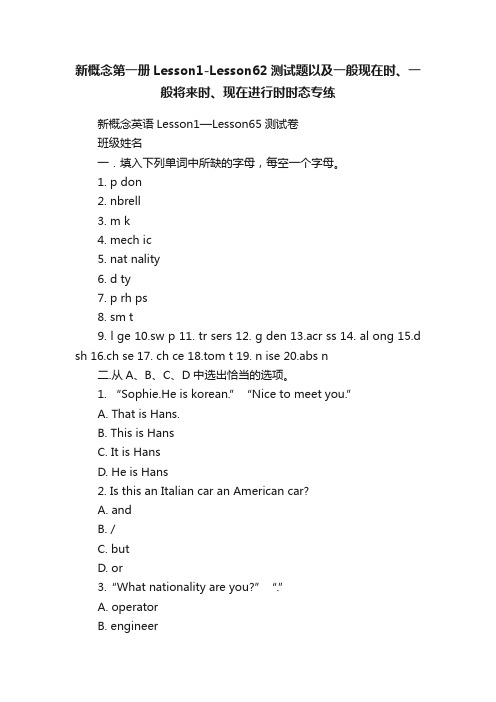新概念英语第一册时态总结+练习
新概念英语第一册语法专项练习卷--时态复习

语法专练-- 时态专练★一般过去时:句型结构:二.标志词:不规则动词过去式:am, is — are— do— go— say— see— understand— lose— speak— put— take— find— read— give— meet— swim— cut— buy--- wear— have— leave— drive— sell— cost— set— shut— come— rise— eat— fly— catch—fall— hurt— spell—用所给动词的适当形式填空1.I ___________ (go) to the cinema yesterday.2.I didn’t ___________(do)my homework last week.3.There __________ (be) a lot of books left on the desk.4.She _________ (have) a holiday last summer.5.It ______ (be) Ben’s birthday last Friday.6.We all ______ (have) a good time last night.7.He ________ (jump) high on last Sports Day.8.She likes ______newspapers, but she _____ a book yesterday. (read)9.He _____ football now, but they _____ basketball just now. (play)句型转换1.I finished my homework at 9 o’clock last night. (否定)2.She was my teacher. ( 一般疑问,肯定回答)3.There were some students in the classroom. (否定)4.I did some housework yesterday afternoon. (一般疑问,否定回答)5.I went to Beijing for my summer holiday last year. (划线提问)6.I went to Beijing for my summer holiday last year.7.I went to Beijing for my summer holiday last year.★一般将来时句型结构:标志词:用所给动词的适当形式填空1.I _______________________ (go) to America next year.2.She ______________________ (come) back in two weeks.3.We ________________________ (not have) any lessons tomorrow.4.There _________________________ (be) a lot of people in tomorrow’s meeting.句型转换1.I will clean the windows tomorrow. (否定,一般疑问,肯定回答)2.She will have a holiday next month.(同上)★现在完成时句型结构:标志词:不规则动词过去分词:am, is — are— do— go— say— see— understand— lose— speak— put— take— find— read— give— meet— swim— cut— buy--- wear— have— leave— drive— sell— cost— set— shut— come— rise— eat— fly— catch—fall— hurt— spell—★用所给动词的适当形式填空1. I ______________________ (live) here for 20 years.2. I _______________________ (not see) him since 1997.3. I _______________________ (eat) hamburgers since I left Beijing.4. He __________ never ______________ (go) to Beijing.5. We ____________ already _____________ (finish) our homework.6. She is the best student I ____________ ever ____________ (see).7. I ___________________ (be) to Shanghai three times.句型转换1. I have already done all the homework. (否定句,一般疑问句,肯定回答)2. She has got a sister. (否定句,一般疑问句,否定回答)★综合练习用所给动词的适当形式填空1.He can _________ (have) dinner in a restaurant this evening.2.--What did he do yesterday? He ____ (stay) at home with his brother.3.She ____________ (talk) to her mother just now.4.I ____________ already _____________ (finish) my homework.5.She _____________ (tell) her mother the truth last night.6.He _______________ (be) a father since last year.7.--- What was the weather like yesterday? --- It _________ (rain).8.I _____________ (type) the letter last week.9.You must _______________ (send) the letter to the boss.10.I ________________ (go) to school tomorrow morning.11.She _____________ (come) to the party tomorrow night.12.It ____________ (rain) last night.13. You’d better __________________ (not catch) the 7:00 flight.14. He says that his friends ___________ (visit) him next week.15. They ___________ just _____________ (clean) the room.★宾语从句完成下列宾语从句1.李明说他喜欢玩电脑游戏。
(完整word版)新概念一时态及练习题

五种时态讲解及练习题英语的时态(tense )是一种动词形式,不同的时态用以表示不同的时间与方式。
下面就英语中常见的八种基本时态进行阐述,其它的时态都是在这八种时态的基础上结合而成的。
一、一般现在时:1. 概念:经常、反复发生的动作或行为及现在的某种状况。
2. 时间状语:always, usually, often, sometimes, every week (day, year, month...), once a week, on Sundays,3. 基本结构:动词原形(如主语为第三人称单数,动词上要加(e )S )4. 否定形式:am/is/are+not;此时态的谓语动词若为行为动词,则在其前加don 't, 如主语为第三人称单数,则用doesn 't ,通常还原行为动词。
5. 一般疑问句:把be 动词放于句首;用助动词do 提问,如主语为第三人称单数,则用doe s ,同时,还原行为动词。
6. 例句:It seldom snows here.He is always ready to help others.Action speaks louder than words.1.I like ____________ (swim).2.He _________(read) English every day.3.We _________(go)to school at seven in the morning.4.Mike________(go)to school at seven in the morning.5.My mother________(like) ______(go) shopping.6.I can ________(draw) many beautiful pictures.7.She_________(make) a model plane.8.Do you ________(like)_________(run)?9.Does he_________(like)_________(jump) ?10.Does Nancy_________(grow)flowers on Saturday ?11.The teachers________(like)___________(dance).12.The teacher________(like)____________(dance).2)用所给的人称改写句子1.I take photos on Sunday. ( Mike)2.We grow beautiful flowers. (she)3.They like collecting stamps. (Ben)4.I listen to music carefully. (my aunt)5.You like making a model ship. (Helen二、一般过去时:1. 概念:过去某个时间里发生的动作或状态;过去习惯性、经常性的动作、行为。
新概念英语第一册时态专项练习

1.一. Fill in the blanks with right forms.2.The Smiths __________ (watch ) TV at the moment.3.Jimmy _______(not finish) his homework yet.4.My mother told me ______(buy) some meat.5.Mary _______(like) _______(play) the piano very much.6._______ you ever _______ (go) to India?7._______ Wind _____(go) to Paris last month?8._______ Ian ______(sell) his house yet?9.He ___________ (move) tomorrow.10.It________ (snow) tomorrow.11.Angel ________ (fly) to Seoul the month after next.12._______ you________ (return) in 2 days?13.What _______ you _________ (do) with this vase?14.She _____ never ________(go) to Tokyo.15.How long ________ Robert ________(go) in Madrid?16.______ he ______ (go) yet?17.Andy _________ (borrow) those books for a week.18.Jason _____________ (go) to Berlin many times.19.Wendy ______________ (teach) us English since 3 years ago.20.________ you ________ (go) to Rome last summer?21.When _____ you _____ (see) this film? Yesterday.22.When ______ you ______ (retire)? Next year.23.When _____ he ______(drive) here? He ______ here last night.24.The mechanics can ________ (repair) it.25.I want _________ (swim) in hot days.26.She is trying ________ (learn) English.二. Ask questions about the underlined.1.He’.bee.awa.fro.hom.fo..years.2.Sh.sol.he.restauran..day.ago.uall.buy.som.newspaper.a.th.newsagent’s.4.Jerr.ha.spen.500,00.o.hi.ne.car.5.Win.wil.retur.t.Londo.th.wee.afte.next.6.M.parent.ar.makin..shoppin.lis.now.7.M.grandp.doe.mornin.exercis.everyday.8.M.daughte.ofte.goe.t.schoo.o.foot.9.Ther.ar.1,00.student.i.m.school.10.Ou.mat.teache.i.ver.strict.。
新概念英语第一册语法及专项练习

新概念英语第一册语法点归纳新概念一共144课,其中单课为课文,双课为语法和练习。
整本书是以单数课为正课,并附带有插图而双数课则是针对单数课所讲的内容有针对性地进行练习,从此出展现出整个新概念一教材区别于其他教材的独特之处。
以下是对新概念一整本教材的理解和剖析,以供各位对整个课本的理解和把握上参考和借鉴。
首先根据课本中出现的时态来分析:本册书的语法出现层次性和规律性是很强的,首先我们先来整本书中都出了哪些时态,这些时态的具体分布和讲解时我们大家需要注意的递进性。
Lesson 31—34 现在进行时Lesson 37—40 第一次出现be going to 的将来时Lesson 51—56 一般现在时Lesson 67—76 为一般过去式Lesson 83—90 为现在完成时Lesson 91—96 为一般将来时(will)Lesson 117—118 过去进行时Lesson 119—120 过去完成时除去前面所有时态和句型所占据的76课我们一起来看一下以下的68课,每一课小的语言点,语法点都是在什么地方,应该用什么样的方式来讲解。
在这里告诉学员新概念一的每一个单课的重点都是出现双课的标题和课后的练习题里面。
Lesson1—2语言点:与陌生人说话或引起别人的注意。
Excuse me. Yes? Pardon? Thank you very much.语法点:主系表结构this为主语,名词做表语1的一般疑问句以及它的肯定回答。
Is this your handbag? Yes, it is.Lesson 5—6语言点:如何介绍别人。
This is Miss Sophie Dupont. Nice to meet you.语法点:主语为第三人称单数的主系表结构。
She is French. He is German. It’s a Volvo.(L6)a/an 的使用。
Lesson 7—8语言点:如何自我介绍和相互认识。
新概念第一册Lesson1-Lesson62测试题以及一般现在时、一般将来时、现在进行时时态专练

新概念第一册Lesson1-Lesson62测试题以及一般现在时、一般将来时、现在进行时时态专练新概念英语Lesson1—Lesson65测试卷班级姓名一.填入下列单词中所缺的字母,每空一个字母。
1. p don2. nbrell3. m k4. mech ic5. nat nality6. d ty7. p rh ps8. sm t9. l ge 10.sw p 11. tr sers 12. g den 13.acr ss 14. al ong 15.d sh 16.ch se 17. ch ce 18.tom t 19. n ise 20.abs n二.从A、B、C、D中选出恰当的选项。
1. “Sophie.He is korean.”“Nice to meet you.”A. That is Hans.B. This is HansC. It is HansD. He is Hans2. Is this an Italian car an American car?A. andB. /C. butD. or3.“What nationality are you?”“.”A. operatorB. engineerC. teacherD. French4. “What’s Alice?”“.”A. She is ItalianB. She is goodC. She is a nurseD. She is nurse5. “How is Jack today?”“.”A. He is AmericanB. He is a milkmanC. He is a studentD. He is fine6. “Whose pen is this?”“.”A. It’s myB. It’s yourC. It’s herD. It’smy son’s7. Come see it.A. orB. toC. /D. and8. “Give please,Jane.”“Here you are.”A. some glasses meB. Isome glassesC. some glass to myD. me some glasses9. It is the left.A. inB. onC. /D. of10. “What’s your job?”“I am a .”A. cookB. cookmanC. cookerD. cook-er11. room is large.A. Mr SmithB. Mr Smith’sC. Mr Smiths’D. Mr Smiths12. Tom and I playing in the garden.A. isB. areC. amD. be13. She is sitting the classroom.A. in front ofB. it the front ofC. on front orD. on the front of14. I am going to rutn .A. onB. the TVC. the TV onD. on the TV15. Is there rice in the bowl?A. anyB. someC. manyD. no16. It’s often cold the North.A. onB. inC. /D. of17. Can I have the key the front door.A. withB. inC. onD. to18. “Must I call him now?”“No,you .”A. can’tB.may notC. needn’tD. mustn’t19. He often to the butcher’s, but he didn’t yesterday.A. go goB. goes goesC. go goesD. goes go三.用所给词的正确形式填空。
新概念第一册时态语法练习

新概念一1--144课时态语法练习一、用适当的关系代词或关系副词填空1. The house _______ we live in is very big.2. The boy ______ is wearing the black jacket is very clever.3. This is the book_____ he gave me for my birthday.4. The man _______ talked to you just now is an engineer.5. This is the man ________ wants to see you.6.The student ___________ answered the question is Zhang Hua.7.The man ___________I met yesterday lent me some money.8.The woman _______________ you saw is our English teacher.9.The runner ________________ you are asking about is over there.10Here is the pen _________ you lost the day before yesterday.11.This is shirt _______________I bought yesterday.12.The book ____________ is on the table is mine.13.The film ____________ they are talking about is very interesting.二、填空1.It’s eight o’clock. The students _____ an English class.A. haveB. havingC. is havingD. are having2.Listen! The baby _____ in the next room.A. cryingB. criedC. is cryingD. cries3.Look! The twins _____ new sweaters.A. are wearingB. wearingC. are wearD. is wearing4.Mrs Read _____ the windows every day. A. is cleaning B. clean C. cleans5.We _____ music and often _____ to music.A. like/ listenB. likes/ listensC. like/ are listening6.She _____ up at six in the morning. A. get B. gets C. Getting三、填空:1.My father always __________(come) back from work very late.2. The teacher is busy. He __________ (sleep) six hours a day.3. Listen! Joan __________(sing) in the classroom. She often __________ (sing) there.4. __________ your brother __________(know) Japanese?5. Where __________ you __________ (have) lunch every day?6. The girl __________(like) wearing a skirt. Look! She __________(wear) a red skirt today.7.---I ________(like)to eat some vegetables. What_______ Sally_______(like) to eat?---She_______(like) beef, but she_______( not like) chicken.8. We often _________(play) in the garden and we_________(play) in the garden now .9.What _____ he usually _______(do) in the afternoon ?10._________ you usually ________(clean) your teeth every morning ?11._______(be) there any parks here in 1950 ?---There ____________.(be not)12.What_______ (do) you do three days ago ?13.I _______(be) tired .I _________________(go ) to bed early last night .14..My mother __________(cook) some nice food now .15_________Helen __________(wash) clothes ? ----Yes ,she is .16.Did you meet Sam this morning ?----No ,I _____________(not meet) him . I________(meet)his wife.四、句型转换:1. They are doing housework .一般疑问句:否定句:2.The students are cleaning the classroom .一般疑问句:否定句:3.I’m playing the football in the playground .(对划线部分进行提问)4.Tom is reading books in his study . (对划线部分进行提问)五、改错题1.How is Jane yesterday? _________2.He go to school by bus last week. _____ ____3. He wait for you three hours ago. ___ __4.Who find it just now ? ___ ____二、按要求变换句型。
新概念英语第一册语法总结[八种时态][句型和语法]
新概念英语第一册语法总结(上)[八种时态]新概念一语法总结(上)一.时态:一般现在时,现在进行时,一般过去时,现在完成时,一般将来时,过去进行时,过去完成时,过去将来时1.一般现在时表示一般性,经常性的动作或一般性事实。
含有be动词的句子He is a teacher.The girl is very beautiful.Tim and Jack are students.★变疑问句将be动词移到句首Is he a teacher?Is the girl very beautiful?Are Tim and Jack students?★变否定句在be动词后面加notHe is not a teacher.The girl is not very beautiful.Tim and Jack are not students.★肯定回答及否定回答Yes, he is. No, he is not.Yes, she is. No, she is not.Yes, they are. No, they are not.不含有动词的句子,即含有一般动词的句子第三人称单数及单数名词He likes books.She likes him.The dog likes bones.★变疑问句在句首加does, 动词变为原型Does he like books?Does she like him?Does the dog like bones?★变否定句在主语及动词之间加doesn’t, 动词变为原型He doesn’t like books.She doesn’t like him.The dog doesn’t like bones.★肯定回答及否定回答:Yes, he does. No, he doesn’t.Yes, she does. No, she doesn’tYes, it does. No, it doesn’t.注意:第三人称单数形式一般在动词后面加S,不要和名词复数混淆,变否定句或疑问句时名词复数没有任何变化。
新概念英语第一册语法总结(上)[八种时态]
新概念英语第一册语法总结(上)[ 八种时态] 一.时态:一般现在时,现在进行时,一般过去时,现在完成时,一般将来时,过去进行时,过去完成时,过去将来时1. 一般现在时表示一般性,经常性的动作或一般性事实。
含有be 动词的句子He is a teacher.The girl is very beautiful.Tim and Jack are students.★变疑问句将be 动词移到句首Is he a teacher?Is the girl very beautiful?Are Tim and Jack students?★变否定句在be 动词后面加notHe is not a teacher.The girl is not very beautiful.Tim and Jack are not students.★肯定回答及否定回答Yes, he is. No, he is not.Yes, she is. No, she is not.Yes, they are. No, they are not.不含有动词的句子,即含有一般动词的句子第三人称单数及单数名词He likes books.She likes him.The dog likes bones.★变疑问句在句首加does, 动词变为原型Does he like books?Does she like him?Does the dog like bones?★变否定句在主语及动词之间加doesn’t动, 词变为原型He doesn ’t like books.She doesn ’t like him.The dog doesn ’t like bones.★肯定回答及否定回答:Yes, h e does. No, he doesn ’ t.Yes, she does. No, she doesn ’tYes, it does. No, it doesn ’t.注意:第三人称单数形式一般在动词后面加S,不要和名词复数混淆,变否定句或疑问句时名词复数没有任何变化。
新概念第一册时态练习题
一、用动词的正确形式填空1. There is ____(a, an the )book on the desk。
2。
I have ____orange .____orange is very sour。
( a,an ,the)3.______(A,An ,The)blackboard in our classroom is big4. What _______ she ______ (do) yesterday?She ______ (visit)her grandparents5。
Tom _________ (play)the piano every Saturday。
Now he________ (play).6。
_______ the monkey _______ (like)climbing trees?Yes, it _______7. Look at the man! He ____________ (read)a magazine.8. Look!The plane ______________ (fly)over the building.9. Listen! My aunt ____________ (sing)in the room. She is a singer。
She _____ (like)singing。
She ___________(have) a music show。
She is excited10. How ______ your father _______ (go) to work every day?He _________ (go) by bike. But it’s cold today. He ___________ (take) the No。
21 bus,, and he ____________ (go) to work by taxi yesterday二、选择题1。
新概念英语第一册时态复习
• 3.一般过去时:表示发生在过去的动作或 事情。 • yesterday、last……、……ago • 构成:①主语+be(was,e动词提前。 • am →was are you→were you • I was late yesterday. • →Were you late yesterday. • 肯定回答: Yes,主语+was/were • 代词:I ,you,he,she,it,we,they.
• 5.现在完成时:构成:主语+have/has+动词过去分 词+其他。 • Have-had-had go-went-gone do-did-done • Be-was/were-been see-saw-seen • (1)表示动作发生在过去,强调已经完成了或对现 在产生影响。(产生结果) • Eg: I have had lunch. • (2)表示动作发生在过去,到现在还没有结束,一 直持续。 • Eg: I have been a teacher since 2009.(我还是)
•一般现在时的句子变化。 •①主语(非单三)+动词原形+其他。 •变一般疑问句在句首加Do。 •②主语(单三)+动词s/es+其他。 •变一般疑问句在句首加Does,动词变回原形。 •(1)Do you often get up at seven o’clock? •Does she often get up at seven o’clock? •动词单三的变化; •①一般直接加s. Play-plays •②以x , s , ch , sh , o + es. •Eg:watch-watches do-does go-goes •③以辅音字母加y结尾,把y变i+es •Empty-empties study-studies •④特殊变化: •Have-has
- 1、下载文档前请自行甄别文档内容的完整性,平台不提供额外的编辑、内容补充、找答案等附加服务。
- 2、"仅部分预览"的文档,不可在线预览部分如存在完整性等问题,可反馈申请退款(可完整预览的文档不适用该条件!)。
- 3、如文档侵犯您的权益,请联系客服反馈,我们会尽快为您处理(人工客服工作时间:9:00-18:30)。
新概念第一册八大时态总结一.一般现在时1.结构基本结构否定句一般疑问句be动词am/is/are+not be提前,放于句首实义动词don’t/doesn’t+do(动词原形)Do/Does+主语+do(动词原形)…?2.用法1)表示经常的、习惯性的动作或存在的状态,常与表示频度的副词连用。
常用的频度副词有:always、often、usually、seldom、never、sometimes, every week (day, year, month…), once a week, on Sundays.频度副词在句中通常放在行为动词之前,系动词、助动词之后。
2)表示主语具备的性格、特征和能力等。
All my friends love football .3)表示客观真理、客观存在、自然现象。
The earth moves around the sun.4)if 引导的条件状语从句主将从现I'll tell him the news if he comes back.二.一般过去时态1.结构基本结构否定句一般疑问句be动词was/were+not was/were提前,放于句首实义动词didn’t+do(动词原形)Did+主语+do(动词原形)…?2.用法表示过去某一时刻或某一段时间里所发生的动作或情况。
常和表示过去的时间状语yesterday, just now, the other day(几天前), in 1982, ago, an hour ago, long long ago, the day before yesterday, last week(year, night, month…), at the age of 5, one day, once upon a time等连用三.一般将来时1.结构一、句型结构:1.be going to 主语+(am/is/are)going to +动词原形2.will :主语+will+动词原形(will为助动词,与情态动词用法相同,与动词原形构成谓语,不需要根据人称进行变化。
)e/go/leave/ arrive 的进行时态表示将来时的概念。
时间状语:tomorrow, next day(week, month, year…), soon, in a few minutes, the day after tomorrow(后天)等连用。
四.现在进行时1.结构:am/is/are+动词的现在分词2.用法:表示现在(指说话人说话时)正在发生或进行的动作。
常与now, right now,at the moment, at this time, these days等时间状语连用。
注:look、listen位于句首或与It’s +钟点连用,也用现在进行时。
五.现在完成时1.结构:肯定句:主语+助动词have(has)+动词过去分词-ed否定句:主语+助动词have(has)+not(haven’t,hasn’t)+动词过去分词-ed一般疑问句:Have(Has)+ 主语+动词过去分词-ed+?特殊疑问句:疑问词+have(has)+ 主语+动词过去分词-ed+?2.用法含义:现在完成时用来表示现在之前已发生或完成的动作或状态,但其结果却和现在有联系, 也就是说, 动作或状态发生在过去但它的影响现在还存在。
1)现在完成时往往与already, yet, just, before,never,ever等连用2)现在完成时还可用来表示过去发生的动作一直延续到现在,与for+段时间或since+点时间连用六.过去完成时1.结构:助动词had+动词过去分词2.用法:1)表示在过去某一时间或动作以前已完成的行为或存在的状态。
即发生的时间是过去的过去。
常与“by the end of/by/before+过去时间”构成的短语连用。
例如:The train had already left before we arrived.2)表示在过去某一动作之前就已经发生或完成了的动作;常用when,before,after 等引导的从句作为动作发生时间先后的对比,先发生的动作用过去完成时,后发生的动作用一般过去时。
When I got to the railway station, the train had already left.当我到达火车站时,火车已经开走了His father had worked in a TV factory for five years before he came here.爸爸来这之前,在一家电视机厂工作了5年。
七.过去进行时1.结构:was/were+动词的现在分词(--ing)2.用法:1)表示过去某一时刻或某一段时间正在进行或发生的动作。
动作发生的特指时间常用一个短语或时间状语从句来表明,如:at this time yesterday,at 7:00 yesterday ,from seven to nine ,at that time以when或while引导的时间状语从句等。
My family were watching TV at that time yesterday.When I arrived,Tom was talking on the phone.What were you doing at 9:00 o’clock yesterday morning.八.过去将来时态1.结构a)would +动词原形b)was/were going to+动词原形2.用法表示从过去某时看将要发生的动作或存在的状态。
常用于主句是一般过去时的宾语从句或间接引语中。
He said that he would finish his work before 9 o’clock. 他说他会在九点之前完成工作。
一、时态综合复习题:1. Listen! The girl (sing) a song.2. Does your sister ______(do) her homework every evening?3.I (be) a student last year.4. The boy ______(do) his homework tomorrow.5. He has (go) to Shanghai.6. It often ______(rain) in summer.7. I _______(go) to Shanghai next week.8. Jim ______(not like) coffee, but he ______(like) tea.9. He has already_________(do) his homework.10. He usually ________(arrive) at home at six o’clock.11. Mr. Black to work on foot yesterday.(go)12. The children _______(do) their homework last night.13.He said he _______(will go) to Beijing.14. When I _____________ (arrive) at the station , the train __________(left) already .15.Petty _____________(just water) the flowers when it _____________(begin) to rain .16. After he _____________(finish) working , he _______________(go) home .17. She _____________(feel) much better yesterday after he _________(take) the medicine.18. He _______________(be) very ill before he ____________________(die) .19.I ______________ (watch) TV when he came in.20.I_______________(do) my homework while my mother was cooking.21. I _______ just __________ my homework. (finish)22. ________ you ________ your science book yet? (find)23. My mother __________ to see me next Sunday. (come)24. I _____ ______ (live) here since 1990.25.He_____ ______(work) here for 10 years.26.When _____ you _____to London? (go)I ______ go there next month.二、句型转换1.I have already had my lunch.否定句:__________________________________________一般疑问句:________________________________________肯定/否定回答:____________________________________2. He has lunch at home.一般疑问句:________________________________________划线提问:____________________________________3.I have had lunch at school.A.一般疑问句:________________________________________B.划线提问:__________________________________________4. I will go to Beijing tomorrow.(同义句)__________________________________.5.He will leave next month. (同义句)A: He _____ ______ ______ leave next month. B: He ______ ________ next month.6.They will go to Shanghai next month.(划线部分提问)___________________________.7.We are going to go to sleep. (对划线部分提问)_______________________________?8. They are going to sweep the floor tomorrow.(划线部分提问)____________________________________________________________?9.The students are singing under the tree.(对划线部分提问)_______ are the students _______ under the tree?10.M y sister likes bananas.(否定句)____________________________________________11.Tony wants some coffee.(一般疑问句)_______________________________________12.She likes singing,too.(否定句)____________________________________________13.He goes to school every day.(否定句)___________________________________________14.They went to Shanghai last year.否定句:_________________________________ 一般疑问句并做肯定回答:_______________________________________________ 划线部分提问:_____________________________________________。
